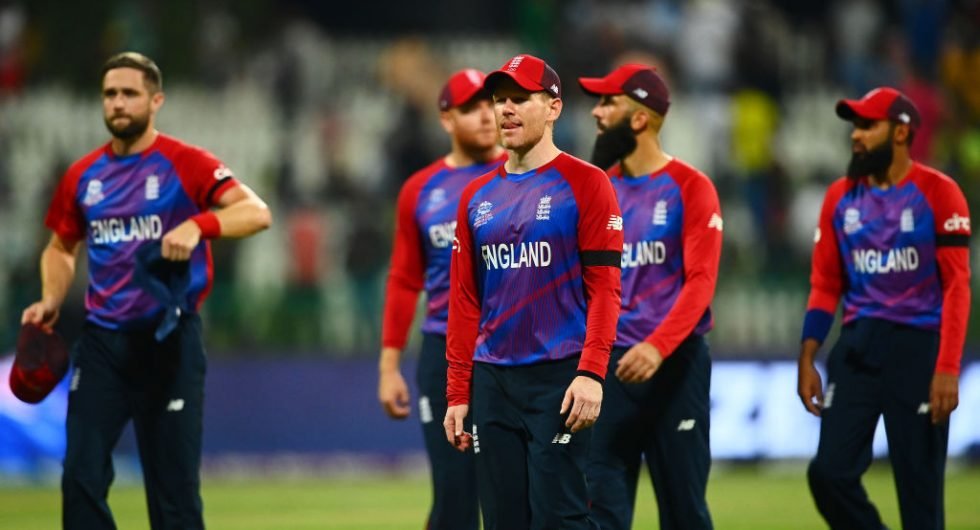Eoin Morgan is undroppable until he deems it otherwise, but has his moment come?

 by Phil Walker
by Phil Walker
@Phil_Wisden 5 minute read
Phil Walker on what comes next for the England captain after a T20 World Cup semi-final exit.
It’s a measure of cricket’s deathly dance marathon that Eoin Morgan can have another stab at immortality in less than a year. No team has ever held both the 50-over and 20-over pots at once and Morgan, the iconoclast outsider turned employee of the decade, knows his history and his place within it. Come October he’ll almost certainly be in Australia, wearing his hats, batting at nine, eyeballing another tilt.
When he says he’s going nowhere, you can understand why. He had half his first team out. His boundary fieldsmen stood on a couple of ropey cushions. Hits happen. He – by which we mean the battalion of analysts beavering away in the match-up basement, firing messages up the dumb waiter – could and should have bowled Moeen Ali. He even seemed a touch marooned at the end, shorn of Tymal Mills and with Mark Wood bowled out. England front-loaded their bowling, leaving Chris Woakes with the thankless task of seeing it out; a minor great with the new white pill, Woakes is not a death bowler, as three overs for 57 in the tournament testify.
But still. The loss of a one-off game of 20 overs speaks of little beyond the footnote of a rotten over from CJ and an un-Rash-like drag-down. And besides, allegiance in cricket being a watery concept anyway, what prevailed emotion-wise after this one, if anything, was a pining for more of this sub-genre of Anglo-Kiwi love-ins. Truly, they’re made for each other.
Morgan was unequivocal. “I’m still offering enough within the side,” he said in the aftermath. “I absolutely love playing cricket at the moment for that changing room. The guys give everything. They’re at the forefront of change on and off the field and we’ve a lot of things to be proud about – I’m incredibly proud to be the leader.”
He occupies an enviable position, carved out by his own hand, of being undroppable until he deems it otherwise. The question, and it’s not kneejerk nor disrespectful to ask it, is if that moment has come.
The carousel keeps revolving. There is basically a white-ball world tournament every year from now until the end of time. There is no ‘suitable moment’. Will Morgan attribute the same ruthlessness to his own position as he’s elicited in every other element of his extraordinary tenure, from 2015’s instant revolution, to the Alex Hales freeze, to David Willey’s last-minute omission in 2019, to every other flinty team-ethic decision he’s made? He will be the first to tell us there’s no room for sentiment.
Part of his genius has been to essentially eliminate from the equation the issue of his batting decline. The other part has involved making himself so central to the mechanism of the whole superstructure that the thought of his removal forewarns some terrifying paranoia of imminent collapse. (For certain England followers, by the way, the idea of their lot as white-ball market leaders will never cease to be novel, transient and fundamentally unconstitutional. Australia’s swagger to the latest showpiece feels right, cosmically speaking.) Put it this way, it’s hard to see Chris Silverwood tapping on his door and, lips aquiver, mouth dry, requesting a sit-down. As long as Morgan wants it, there’s a job for him.
In his post-match self-directed vote of confidence, he spoke more than once about what was happening off the pitch, where he sees some of his best work being done. It’s easy to be sniffy about the gestural emptiness of England’s ‘unity’ black-shirts, immaculately timed to coincide with Ollie Robinson’s debut and a Headingley Test match, but they nonetheless signify the roots of an internal culture which is at least engaging with the big ideas of the day.
It’s a culture curated in large part by Morgan himself. “I think I’ve been a part of a significant change that we feel will lead to something bigger than any of our careers or any trophies we win,” he said when asked about racism in cricket before the semi-final. “It’s not perfect, but we’re making good ground towards change that we want implemented.”
So much flows from him. But for how much longer? This year, he averages 17.71 and strikes at 119 in 39 T20 games. It’s increasingly tricky to dismiss this latest slump as just another blip. Morgan has always been a batter who plays on the edge: it was this creativity and boldness which first seduced English cricket. It’s easy to forget that in his pomp he was a player touched by genius. His form being a famously mysterious thing, it may yet return, though there are reasons, especially with his game against pace, to suspect that at 35 his best days are behind him.
In this team, he snuck in there around the No.7 spot, behind the younger thrusters: the short-course Brearley with his degree in statistics. On the field, he remained of course a soothing authority at extra cover (the T20 equivalent of first slip), exuding and projecting. But is that enough? When Ben Stokes comes back, is it enough? When Harry Brook and Joe Clarke and Will Jacks start next season on fire? Even now in the data age, is the leader still so fundamental to the running of a cricket team that their sheer presence precludes all other factors?
Morgan has always put the requirements of the team before anything else. Ultimately, will they be better placed to finally pull off the double with him as captain, or as non-playing track-suited overlord? This final decision could be the most pressing of them all.

